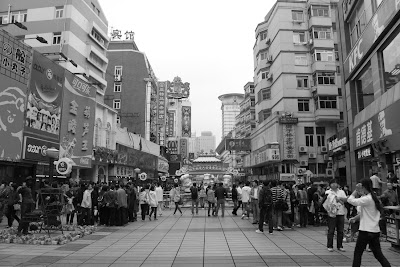
Walking around Nanjing this weekend, the city felt like it was still full of ghosts. The glossy new veneer thrown over the old capitol city cannot begin to cover up the horrors of its recent past; the history of the place seeps through even the name of the city itself. And although flows of capital have given Nanjing new life, but there is still a lot of bad blood.
The Nanjing Massacre of 1937, an event of unmentionable violence, can only be imagined with visions of brutality of the most perverse order.
But for the Chinese, the event has endured in the popular imagination not only as a tragedy, but a symbol of Japanese wrongdoing and a landmark of nationalism. The wounds left by the event, it seems, have been perennially reopened and the younger generation still grapples with the pain and are still taught to be outraged.
As I entered the Nanjing Massacre Museum, one of my chinese teachers, a young, well-educated woman told me, with great indignation, that the Japanese had muddied the event to the point of outright dishonesty in their text books.
"History is history." She said, as if to say that the past was indisputable, and that atrocities should not be denied.
The fact that she did not see the hypocrisy of the comment, in light of Chinese practices of academic and historical censorship, was simply stunning. But she, like most young people, had been conditioned to resent the Japanese.
Those who experience atrocities of war are marked for life, and little can be done to change their prejudices, but to find such sentiments among a younger, better educated, and more well-connected generation left me at a loss for words and with a head full of questions.
Mostly, these questions were about China's feasibility as a superpower, not because of their culture or people, but because of their government's influence on the two. Every country is nationalistic to some extent, but when that nationalism has resonated in the hearts of the young, I begin to worry.
If The New York Times' video in which young people at a music festival burn a Japanese flag is any indication, the Chinese youth culture is going in a dark and frightening direction. Rock music is supposed to unite people, but from the looks of the footage, it's just background noise to the hateful zealotry of young nationalists.
One imagines that the connectivity of this capitalist century encourages global citizenship and cross-cultural understanding, but if the youth - the most connected people in China - harbor such fervent animosity, the reality of capitalism without democracy seems bleak.
No comments:
Post a Comment